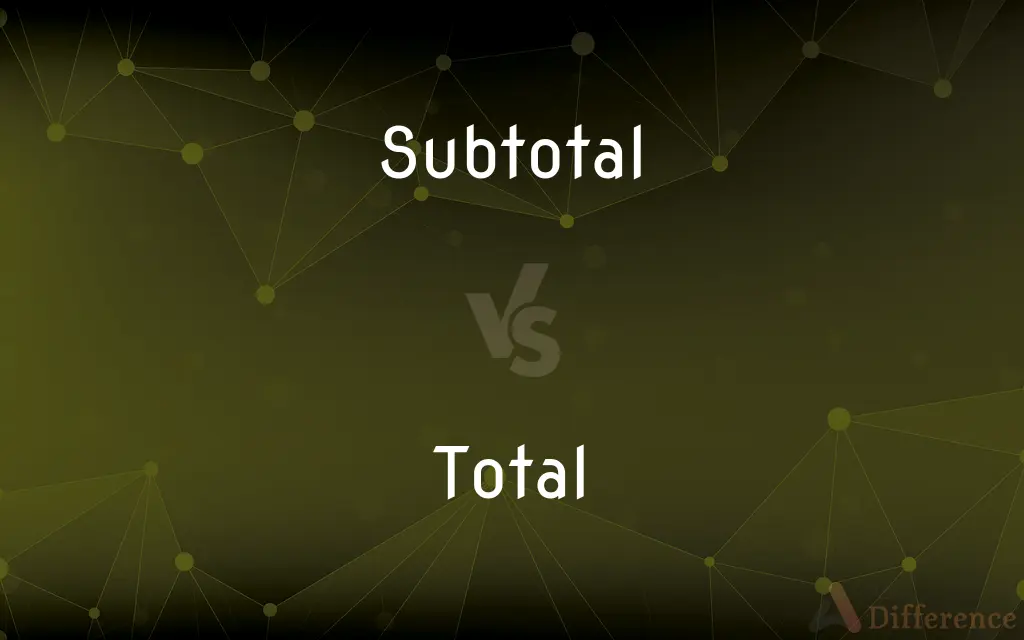Subtotal vs. Total — What's the Difference?
By Tayyaba Rehman — Updated on October 20, 2023
Subtotal is the sum before additional charges or deductions, while Total is the final sum after all adjustments.

Difference Between Subtotal and Total
Table of Contents
ADVERTISEMENT
Key Differences
Subtotal represents a sum that does not include all factors, often excluding taxes or discounts. Total, conversely, encapsulates all elements, providing the final figure one must pay or account for.
Subtotal often provides a preliminary sum, giving a snapshot of costs before additional charges. Total, on the other hand, offers a comprehensive view, taking into account every relevant charge, discount, and addition.
The purpose of providing a subtotal is to give clarity about the base charges, allowing one to see costs before any adjustments. The total ensures that there are no hidden costs and provides the final amount to be paid or received.
In invoices, receipts, or financial reports, a subtotal gives an idea of base costs or earnings. The total, however, is the decisive figure, indicating the final amount due or earned.
While the subtotal gives an initial insight into costs, it might not represent the final amount due. The total, however, is definitive, signaling the end of calculations and adjustments.
ADVERTISEMENT
Comparison Chart
Definition
Intermediate sum of parts of a whole.
Final comprehensive sum after all additions and subtractions.
Inclusion
Does not include all charges or deductions.
Includes every charge, deduction, and addition.
Contextual Use
Often seen in the middle of invoices or bills.
Typically found at the end of bills or statements.
Decision-making Impact
Provides an initial insight, not finality.
Definitive figure used for final decisions.
Financial Implications
Indicates pre-adjustment amounts.
Dictates the actual amount payable or receivable.
Compare with Definitions
Subtotal
A preliminary total excluding certain charges.
The subtotal does not include service fees or taxes.
Total
Complete aggregate of all parts or numbers.
The total number of attendees was 500.
Subtotal
An intermediate total before final adjustments.
Your purchases reach a subtotal of $200 before discounts.
Total
The end sum after all additions and subtractions.
With the discount applied, your total is $90.
Subtotal
A partial sum not including all elements.
The subtotal for the items is $50, but we need to add tax.
Total
A comprehensive figure without exclusions.
The total expenses for the trip amounted to $2,000.
Subtotal
The amount before the final total.
Your subtotal comes to $100; let's add the delivery charge next.
Total
The sum of everything combined.
The total duration of the event was three hours.
Subtotal
Sum of a subset of numbers in a series.
The subtotal for the first three items is $30.
Total
Comprising the whole number or amount
A total cost of £4,000
Subtotal
The total of one set of a larger group of figures to be added.
Total
Complete; absolute
A total stranger
It is a matter of total indifference to me
Subtotal
Add (numbers) so as to obtain a subtotal.
Total
The whole number or amount of something
In total, 200 people were interviewed
He scored a total of thirty-three points
Subtotal
(of an injury or a surgical operation) partial; not total.
Total
Amount in number to
They were left with debts totalling £6,260
Subtotal
Less than total; incomplete.
Total
Damage (something, typically a vehicle) beyond repair; wreck
He almost totalled the car
Subtotal
The total of part of a series of numbers.
Total
An amount obtained by addition; a sum.
Subtotal
To total part of (a series of numbers).
Total
The whole amount of something; the entirety
The storm damaged the total of the housing units.
Subtotal
To arrive at a subtotal.
Total
Of, relating to, or constituting the whole amount; entire
The total population of the city.
Subtotal
The total for a part of a list of numbers being summed.
Total
Complete; utter; absolute
Total concentration.
A total effort.
A total fool.
Subtotal
To calculate a subtotal.
Total
To determine the total of; add up
They totaled the applications at 600.
Subtotal
Less than total; partial.
Total
To equal a total of; amount to
The week's receipts totaled more than $90,000.
Total
To wreck completely; demolish
The driver survived the crash but totaled the car.
Total
To add up; amount
It totals to $25.
Total
An amount obtained by the addition of smaller amounts.
A total of £145 was raised by the bring-and-buy stall.
Total
Sum.
The total of 4, 5 and 6 is 15.
Total
Entire; relating to the whole of something.
The total book is rubbish from start to finish.
The total number of votes cast is 3,270.
Total
(used as an intensifier) Complete; absolute.
He is a total failure.
Total
(mathematics) (of a function) Defined on all possible inputs.
The Ackermann function is one of the simplest and earliest examples of a total computable function that is not primitive recursive.
Total
(transitive) To add up; to calculate the sum of.
When we totalled the takings, we always got a different figure.
Total
To equal a total of; to amount to.
That totals seven times so far.
Total
To demolish; to wreck completely. (from total loss)
Honey, I’m OK, but I’ve totaled the car.
Total
(intransitive) To amount to; to add up to.
It totals nearly a pound.
Total
Whole; not divided; entire; full; complete; absolute; as, a total departure from the evidence; a total loss.
Total
The whole; the whole sum or amount; as, these sums added make the grand total of five millions.
Total
To bring to a total; also, to reach as a total; to amount to.
Total
To determine the total of (a set of numbers); to add; - often used with up; as, to total up the bill.
Total
To damage beyond repair; - used especially of vehicles damaged in an accident; as, he skid on an ice patch and totaled his Mercedes against a tree. From total loss.
Total
The whole amount
Total
A quantity obtained by addition
Total
Add up in number or quantity;
The bills amounted to $2,000
The bill came to $2,000
Total
Determine the sum of;
Add all the people in this town to those of the neighboring town
Total
Constituting the full quantity or extent; complete;
An entire town devastated by an earthquake
Gave full attention
A total failure
Total
Including everything;
The overall cost
The total amount owed
Total
Without conditions or limitations;
A total ban
Total
Complete in extent or degree and in every particular;
A full game
A total eclipse
A total disaster
Total
The final sum of all components.
The total cost, after tax, comes to $110.
Common Curiosities
How does total differ from subtotal?
Total is the final sum after all adjustments, while subtotal is the sum before such adjustments.
Why is subtotal important if we have a total?
Subtotal provides clarity on base costs, allowing one to understand charges before any adjustments.
Which is more crucial, subtotal or total?
While both provide valuable information, the total is more crucial as it indicates the final amount due.
Where might I see both subtotal and total listed?
Both can be found on invoices, receipts, and financial statements, with subtotal preceding the total.
Can there be multiple subtotals on an invoice?
Yes, there can be multiple subtotals if different sections or categories need separate calculations.
Is the total always the final amount on a bill?
Generally, yes, the total is the final comprehensive amount due after all adjustments.
How is subtotal calculated?
Subtotal is calculated by summing up selected elements, often excluding additional charges or deductions.
Are there situations where subtotal equals total?
Yes, if there are no additional charges, discounts, or deductions, subtotal can equal the total.
Is subtotal always less than the total?
Generally, yes, but in cases with discounts or rebates, the subtotal might be greater than the total.
Does total include taxes?
Yes, total typically includes all charges, taxes, and deductions.
What does subtotal represent?
Subtotal represents a preliminary sum, often excluding additional charges like tax or discounts.
Is it essential to check both subtotal and total when reviewing a bill?
Yes, reviewing both can ensure understanding of all charges and any potential errors or discrepancies.
Why might businesses separate subtotal and total?
Separating them provides transparency, allowing customers to see base charges and any additional fees or discounts.
Can the difference between subtotal and total be significant?
Yes, depending on taxes, service fees, discounts, or other adjustments, the difference can be substantial.
In which industries is the distinction between subtotal and total most prominent?
Retail, hospitality, and e-commerce often make clear distinctions between subtotal and total due to taxes, service charges, and discounts.
Share Your Discovery

Previous Comparison
Accidentally vs. Accidently
Next Comparison
Manner vs. MatterAuthor Spotlight
Written by
Tayyaba RehmanTayyaba Rehman is a distinguished writer, currently serving as a primary contributor to askdifference.com. As a researcher in semantics and etymology, Tayyaba's passion for the complexity of languages and their distinctions has found a perfect home on the platform. Tayyaba delves into the intricacies of language, distinguishing between commonly confused words and phrases, thereby providing clarity for readers worldwide.
















































